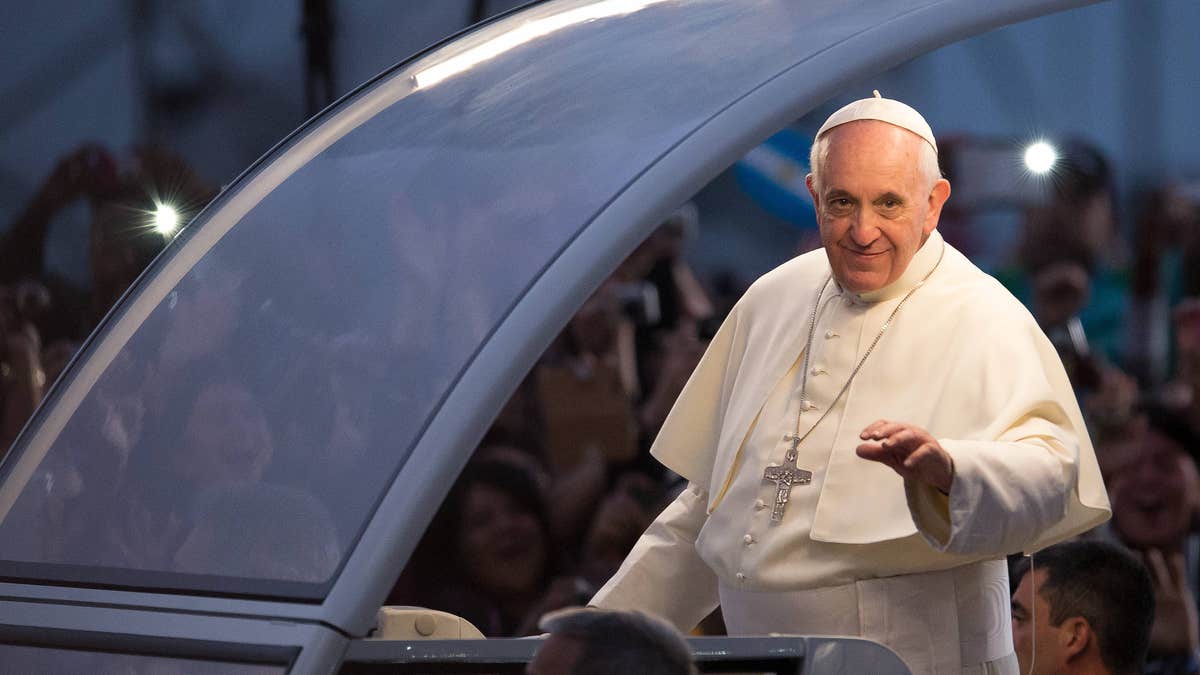
RIO DE JANEIRO, BRAZIL - JULY 26: Pope Francis waves from the Popemobile on his way to attend the Via Crucis on Copacabana Beach during World Youth Day celebrations on July 26, 2013 in Rio de Janeiro, Brazil. More than 1.5 million pilgrims are expected to join the pontiff for his visit to the Catholic Church's World Youth Day celebrations which is running July 23-28. (Photo by Buda Mendes/Getty Images) (2013 Getty Images)
VATICAN CITY (AP) – Pope Francis named his first batch of cardinals on Sunday, choosing 19 men from Asia, Africa, Latin America and elsewhere, including the developing nations of Haiti and Burkina Faso, in line with his belief that the church must pay more attention to the poor.
Francis made the announcement as he spoke from his studio window to a crowd in St. Peter's Square.
Sixteen of the appointees are younger than 80, meaning they are currently eligible to elect the next pope, which is a cardinal's most important task. The ceremony to formally install them as cardinals will be held Feb. 22 at the Vatican.
Since his election in March as the first pontiff from Latin America, the pope has broken tradition after tradition in terms of protocol and style at the Vatican. But in Sunday's list Francis stuck to the church's rule of having no more than 120 cardinals eligible to elect the next pontiff.
The College of Cardinals is currently 13 shy of that 120-mark among eligible-to-vote members. In addition, three cardinals will turn 80 by May. That means Francis chose the exact number of new cardinals needed to bring the voting ranks up to 120 during the next few months.
Some appointments were expected, including that of his new secretary of state, the Italian archbishop Pietro Parolin, and the German head of the Vatican's watchdog office for doctrinal orthodoxy, Gerhard Ludwig Mueller. Two others named Sunday also come from the curia, as the Holy See's Rome-based bureaucracy is known.
But some names were surprising.
The Vatican spokesman, the Rev. Federico Lombardi, said the pope's selection of churchmen from Haiti and Burkina Faso reflects Francis' attention to the destitute as a core part of the church's mission.
Also chosen to become a "prince of the church," as the cardinals are known, was Mario Aurelio Poli, the archbishop of Buenos Aires, a post Francis left when he was elected as the first Latin American pope in March. Poli had impressed Francis by earning a degree in social work from the public university of Buenos Aires.
In the case of the archbishop of Rio de Janeiro, the selection of Orani Joao Tempesta was widely hoped for back home as a kind of reward for Monsignor Orani Joao Tempesta's work in organizing Francis' wildly popular visit to that city in July.
Whether one continent or country has a large contingent of cardinals is heavily watched when it comes time to pick the next pope because churchmen could vote as a geographic bloc in hope of furthering the interests of their flock back home.
Not counting the four picks from the curia, who no longer represent the church in their homelands, the others new voting cardinals include two from Europe, three from North and Central America, three from South America, and two apiece from Africa and Asia.
Vincent Nichols, the archbishop of Westminster, in Britain, called his appointment a "humbling moment" of service to the church.
The youngest new cardinal chosen by Francis is the 55-year-old Monsignor Chibly Langlois from Haiti.
In reading out the names, Francis said the new cardinals, coming from "every part of the world represent the deep church ecclesial relationship between the church of Rome and the other churches scattered throughout the world."
Francis has stressed that the church hierarchy must not view itself as an elite aloof from its flock but instead serve its flock, especially for the poor, others on the edges of society and disillusioned faithful.
Once again on Sunday, a pope has passed over a prominent churchman in predominantly Catholic Ireland as a potential cardinal: Dublin Archbishop Diarmuid Martin. He has irritated some in the Vatican by strongly criticizing how the hierarchy handled the worldwide clerical sex abuse scandal.
In a sentimental touch in Sunday's selections, the three men chosen as cardinals who are too old to vote for the next pope include 98-year-old Monsignor Loris Francesco Capovilla, who had served as personal secretary to Pope John XXIII. That late pontiff will be made a saint along with John Paul II in a ceremony at the Vatican in April.
Follow us on twitter.com/foxnewslatino
Like us at facebook.com/foxnewslatino
